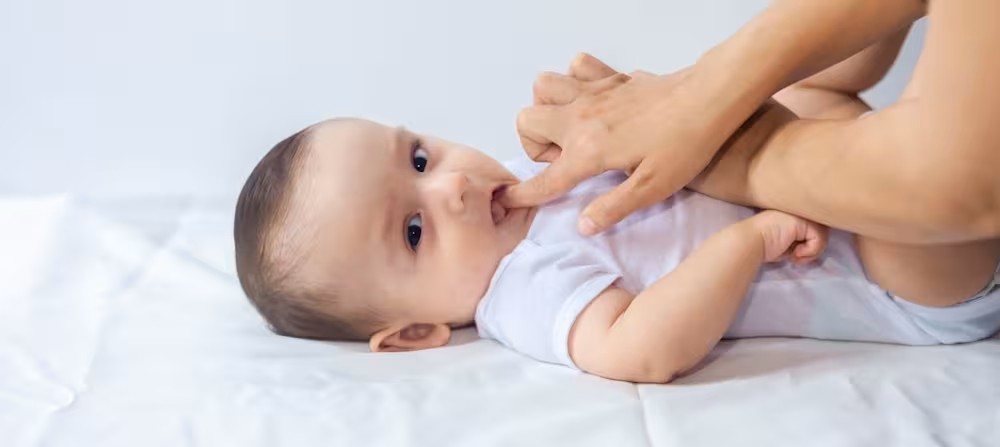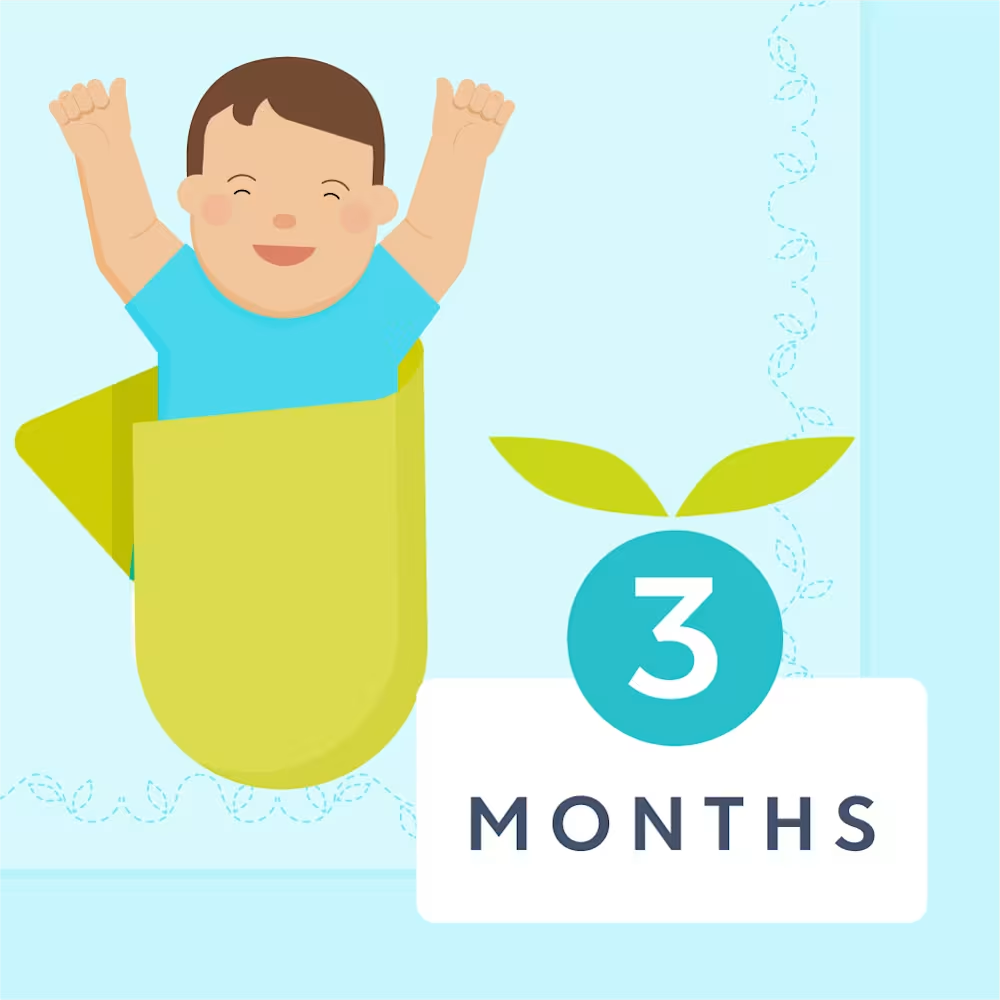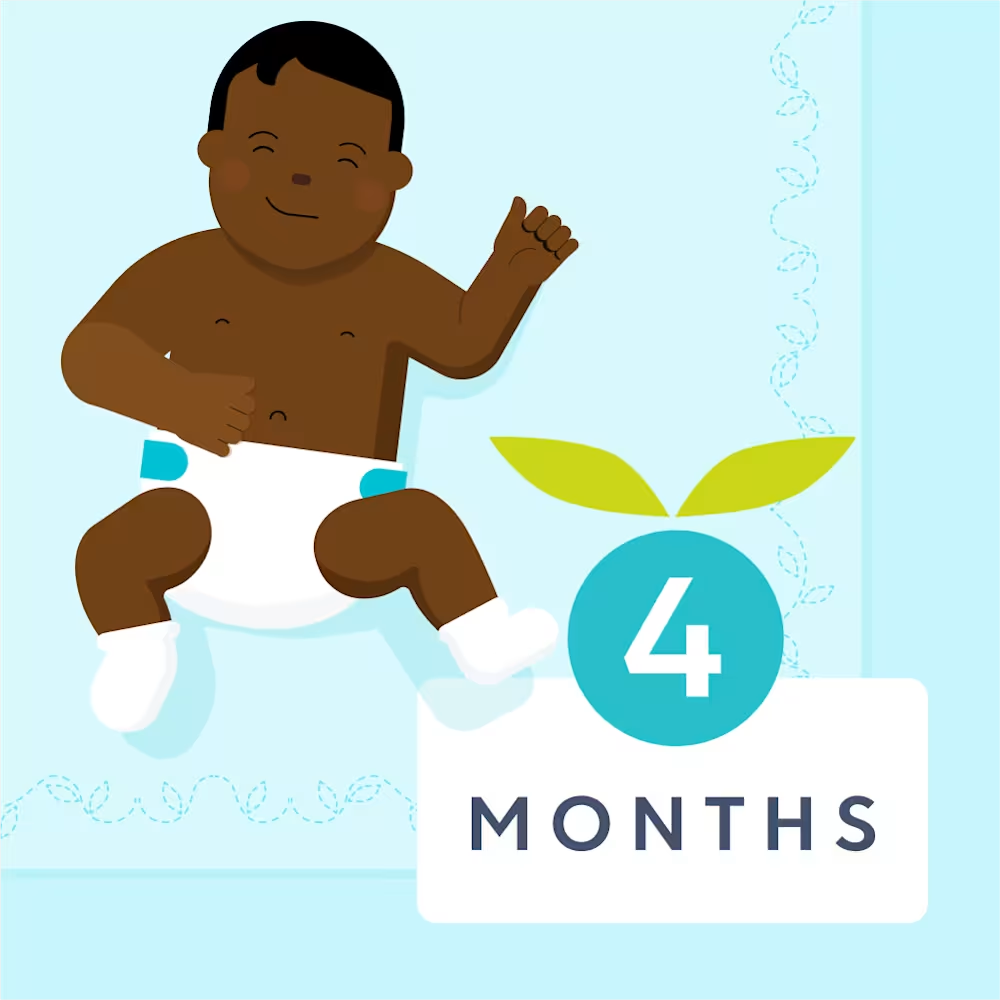Does teething cause sleep regressions?
Updated Dec 02, 2025

Does it feel like every time you turn around there’s some new reason your little one is having trouble sleeping? You’re not alone! Sleep can be impacted by many factors, especially over the first few years of your child’s life. Factors like travel, illness, life changes, and, yes, even getting new teeth can send sleep into a tailspin. While frustrating for parents and uncomfortable for children, teething is an unavoidable part of development. However, the hope is that sleep will improve shortly after a new tooth erupts.
In this article, we’ll help you understand the connection between teething and sleep challenges, give you ways to help comfort a teething child, and provide insight into how you can avoid prolonged sleep issues after a sleep regression.
The connection between teething and sleep regression
3 - 4 months
While many children get their first tooth around 4 - 7 months of age, teething can begin as early as 3 months []. If your baby’s first tooth begins to erupt around , this may coincide with a biological alteration in the way they sleep due to their sleep architecture maturing. This change in a child’s stages and cycles of sleep means your baby will no longer sleep like a newborn and instead have patterns similar to an adult. New sleep challenges may arise at this time — aka the “” — because babies will have a brief period of awakening after each sleep cycle and may have trouble getting back to sleep independently.
If your baby is experiencing teething pain and going through this biological change at around 3 - 4 months, sleep may be bumpy. Signs of an may include sudden worsening of night sleep, increased crying and fussing during sleep times, difficulty settling for sleep, and short or skipped naps. like night waking, sleep resistance, and fussiness due to discomfort. Teething can also be accompanied by gum swelling/tenderness, refusal to eat (which may lead to night wakings due to hunger), increased drooling, biting, and chewing.
4+ months
All babies will go through the previously mentioned biological change in sleep at around 3 - 4 months (though their sleep patterns won’t always worsen). Any can occur at any age. We define a sleep regression as a significant, sudden decline in sleep patterns. When sleep goes south after 4 months, contributing factors may include teething, illness, travel, sleep-onset associations, milestone mastery, etc. Teething can independently lead to a sleep regression and can also intensify sleep disruptions if it coincides with other factors like developmental milestones. For example, if your child is starting to crawl at 8 months and is also getting a tooth, this may lead to even rockier sleep for a time.
On the other hand, when there isn’t an obvious explanation for sudden poor sleep, parents often speculate that their child may be teething, especially if their new fussiness or discomfort continues during awake times as well.
How teething can impact sleep
Teething may be a contributing factor to a sleep regression as discomfort from getting new teeth can lead to increased night wakings, short or skipped naps, resistance to sleep, etc.
If teething pain is the primary cause of sleep disturbances, you’ll likely notice that your child is also uncomfortable during non-sleep times.
Consider adding measures to soothe teething pain (like gum massage, teethers, and doctor-approved pain relievers) to your child’s bedtime during these periods.
Teething pain typically resolves in a little over a week [], but sleep may be impacted longer if new sleep onset associations were created during this time.
As we mentioned, teething pain can be a contributing factor to a sleep regression. If your little one is uncomfortable due to new chompers breaking through, sleep may be disrupted. One way teething pain may impact your child’s shuteye is by causing them to wake amid a sleep cycle, after 10 - 20 minutes of sleep instead of in between 50-minute cycles. These disrupted sleep patterns may be a telltale sign that new teeth are on the way! Night wakings, difficulty settling for sleep, short or skipped naps, etc. are also common when children are experiencing teething discomfort.
Note that if teething discomfort is the primary cause of disrupted sleep, you’ll likely see other signs of pain or irritability during waking hours as well. If you’re confident your child is experiencing teething pain, consider temporarily adding support to their sleep routine in hopes of soothing some of the discomfort. This may look like applying pressure to swollen gums, offering a pain reliever before bedtime (always get your pediatrician’s advice first!), and/or adding in some extra snuggles and comfort measures before sleep.
You may be wondering how long teething will derail sleep. The answer usually depends on how your child falls asleep. If your child typically falls asleep independently and teething temporarily causes a decline in sleep, this usually resolves once the pain subsides — in a little over a week []. Sleep may be impacted longer if new sleep onset associations were created during this time, i.e. offering lots of extra assistance falling asleep. If this is the case, parents often consider helping their child learn to fall asleep independently using any number of . We’re also here to help! If you’re looking for step-by-step guidance for your little one, consider submitting for a custom sleep plan through.
4 tips and strategies to manage sleep during teething
Tip #1: Help soothe your child’s teething discomfort
When it comes to teething, sleep disruptions may be inevitable for a time. However, there are a few ways you can try to make discomfort more manageable for your child. For a breastfed or bottle-fed infant, consider a by dipping your clean finger in cool water and gently massaging the area where the tooth is erupting. This may reduce pain before eating, which can lead to a fuller feed and fewer sleep disruptions.
Other popular methods of alleviating teething discomfort include freezing wet washcloths for little ones to chew on, using teethers (silicone rings and the like), and giving a pain reliever before bedtime [] (like infant acetaminophen or infant ibuprofen) if your child is over 6 months and you’ve consulted with a medical provider.
Tip #2: Maintain a consistent bedtime routine as much as possible
Children are often extra clingy and fussy — especially at sleep times — when they’re having a tough time teething. We recommend offering additional comfort to help your little one, while also sticking to your typical bedtime routine as much as possible. If you offer lots of extra assistance falling asleep, this can lead to new sleep onset associations that can disrupt sleep [] when teething subsides.
However, life happens! If your child is really struggling to sleep while teething, sometimes it can be best to do whatever you have to do to help them get the rest they need. You can always get back to encouraging independent sleep habits after their teething pain has subsided.
Tip #3: Move bedtime early if naps have been short
If your child’s day sleep quality and/or sleep duration have declined due to teething, we recommend moving bedtime earlier (but not before 6:00 PM). Consider starting your little one’s bedtime routine 15 - 30 minutes earlier to give them the opportunity to get the sleep they need and avoid overtiredness. We get it, though — overtiredness is sometimes inevitable during these periods of discomfort. However, overtiredness often makes it more difficult for children to fall asleep and stay asleep, so you’ll want to avoid it if possible.
Tip #4: Create a comfortable and soothing sleep environment
Making sure your little one is comfortable in ways you can control may be helpful when it comes to teething and sleep. Try your best to ensure their sleep space is at a and darkened, and consider using . If you don’t already use them, a may give your child a little extra comfort during sleep times.
When to talk to a doctor
Teething (and sleep challenges) are a normal part of child development. However, you know your child best and if you notice any red flags when it comes to their health or sleep patterns, it's usually best to err on the side of caution and seek advice from a professional. Contact your child's doctor (or dentist) if you have questions or concerns.
Here are some instances where you might consider checking in with your child’s doctor or dentist:
Persistent fussiness: Signs of pain, extra hard to soothe
Feeding or weight gain concerns: Consistently skipping meals, not gaining weight as expected (though growth slows down in your baby’s second year)
Unusual symptoms: Abnormally swollen or bleeding gums, vomiting, diarrhea, fever, rash etc.
Unusual sleepiness: Overly drowsy, hard to wake
Other red flags: If something feels off, contact your healthcare provider.
Takeaway
Infants typically get their first tooth around 4 - 7 months, but teething can occur as early as 3 months. If your child is teething in the 3 - 4 month range, this may coincide with the “four month sleep regression” which marks a neurodevelopmental change in the way your baby sleeps. Both teething and this biological alteration can impact sleep.
After 4 months, teething can be a contributing factor to a sleep regression. We define a sleep regression as a sudden, significant decline in sleep patterns. This typically looks like increased night wakings, resisting sleep, and short or skipped naps.
Teething pain typically lasts about a week [] on its own, but sleep challenges can persist if new sleep onset associations were introduced during this period of discomfort — like rocking to sleep, etc.
There are a few ways to help your child sleep while they’re experiencing sleep challenges due to teething. These include gum massage, using teethers, offering infant pain relievers (after consulting with a pediatrician), and providing extra snuggles and comfort before sleep. However, we recommend sticking to your child’s typical bedtime routine as much as possible to avoid prolonging sleep disruptions.
Share article:
Note: The content on this site is for informational purposes only and should not replace medical advice from your doctor, pediatrician, or medical professional. If you have questions or concerns, you should contact a medical professional.
4 Sources
Share article:





